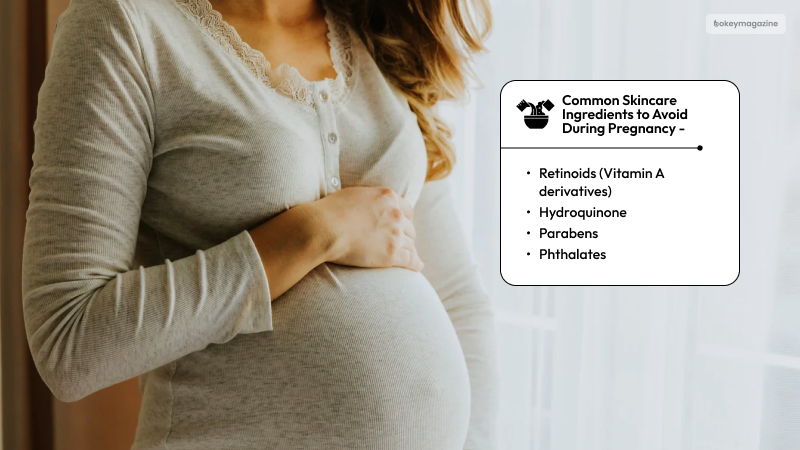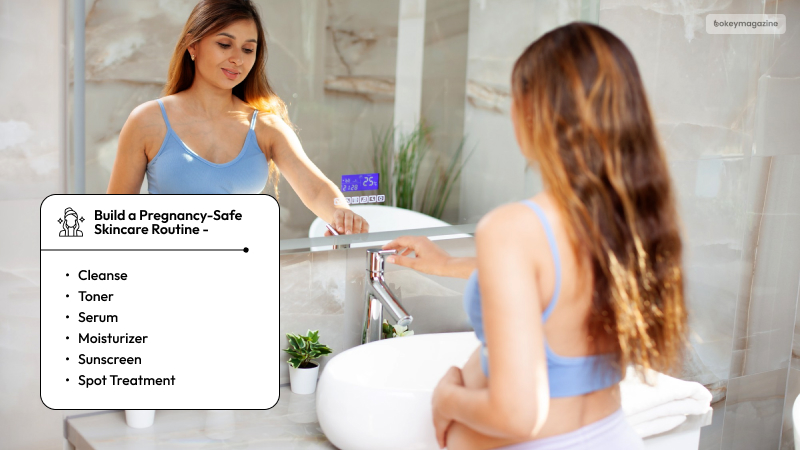
Is It Okay to Do Skin Care During Pregnancy?
During pregnancy, taking care of the skin becomes even more important. Pregnancy can bring about various changes to your skin, from increased sensitivity to hormonal fluctuations. However, it’s essential to be mindful of the products you use during this period and ensure they are safe for you and your growing baby.
In this article, we’ll explain everything you need about pregnancy-safe skincare. From ingredients to avoid to must-have products, we’ll help you keep that pregnancy glow while ensuring you and your baby stay safe and healthy. Let’s dive in!
Common Skincare Ingredients to Avoid During Pregnancy

During pregnancy, certain ingredients in skincare products can pose potential risks to you and your baby. It’s important to steer clear of the following:
- Retinoids (Vitamin A derivatives): Found in anti-aging and acne treatments, retinoids (including retinol and isotretinoin) can cause birth defects. Hence, it’s best to avoid products containing these ingredients.
- Hydroquinone: This ingredient is used for skin lightening and reducing dark spots, or pigmentation caused due to conditions such as due to melasma or chloasma (both of which can occur during pregnancy). However, our body absorbs a significant amount of hydroquinone. Hence, it is best to avoid due to potential risks.
- Parabens: These preservatives have been associated with hormonal disruptions.
- Phthalates: These chemicals, often found in fragrances, can interfere with endocrine function.
By learning about these potentially unsafe ingredients, you can make informed choices and prioritize your skin’s health during this special time. It would help if you also considered asking your obstetrician or dermatologist before using these products.
How to Build a Pregnancy-Safe Skincare Routine?

Crafting a pregnancy-safe skincare routine is crucial for your and your baby’s well-being. Start by evaluating your current products and identifying any potentially harmful ingredients. Replace them with gentle, nourishing alternatives that are specifically formulated for expectant mothers.
Consider the following steps to build a pregnancy-safe skincare routine:
Step 1: Cleanse
Start with a gentle, alcohol and fragrance-free cleanser to remove dirt and impurities without stripping your skin of its natural oils. Look for products with ingredients like glycerin or ceramides.
Step 2: Toner
Use a hydrating toner to balance your skin’s pH levels. Avoid toners with alcohol or harsh astringents. Instead, opt for those with soothing ingredients like rose water or chamomile.
Step 3: Serum
Incorporate a pregnancy-safe serum targeting specific skin concerns, such as brightening or soothing. Look for ingredients like hyaluronic acid for hydration or vitamin C for brightening. Avoid serums with retinoids or high-dose salicylic acid.
Step 4: Moisturizer
Depending on your skin type, choose a moisturizer that provides long-lasting hydration and nourishment. Look for products containing shea butter, aloe vera, or squalane. These ingredients help lock in moisture and soothe the skin.
Step 5: Sunscreen
Protect your skin from harmful UV rays with a physical (mineral) sunscreen containing zinc oxide or titanium dioxide. These are safe for pregnancy and provide broad-spectrum protection.
Step 6: Spot Treatment
If you experience breakouts, use spot treatments with benzoyl peroxide or azelaic acid, generally considered safe in low concentrations.
Remember, consistency is key when building a pregnancy-safe skincare routine. Stick to your regimen and be patient as your skin adjusts.
Nurturing your Skin During Pregnancy: Daily Care and Maintenance
Maintaining a consistent, pregnancy-safe skincare routine is essential for keeping your skin healthy and glowing throughout pregnancy. Incorporate the following daily care and maintenance practices:
- Gentle cleansing: Avoid harsh soaps and use a mild, fragrance-free cleanser to remove impurities without stripping your skin.
- Hydration boost: Apply a nourishing, pregnancy-safe moisturizer morning and night to lock in moisture and prevent dryness. Also, drink plenty of water.
- Sun protection: Diligently apply a broad-spectrum, mineral-based sunscreen with an SPF of 30 or higher before going outdoors.
- Exfoliation: Use a gentle, physical, or chemical exfoliant once or twice a week to slough off dead skin cells and promote a radiant complexion. But avoid harsh scrubbing. It does more damage than good.
- Facial massage: Incorporate gentle facial massage techniques to improve circulation and promote lymphatic drainage.
- Stress management: Practice relaxation techniques, such as deep breathing or meditation, to help manage stress and its impact on your skin.
Most importantly, always listen to your skin. Pay attention to any sensitivities or changes and adjust your routine accordingly. These daily care and maintenance practices will help nurture your skin and maintain a healthy, glowing complexion throughout your pregnancy.
But you should consult with your doctors before incorporating anything new. Seek advice from your dermatologist or esthetician to ensure your skincare regimen is pregnancy safe.
Addressing Common Skin Concerns During Pregnancy

Pregnancy can bring about a variety of skin concerns, from increased sensitivity to hormonal breakouts. Address these common issues with pregnancy-safe solutions:
Increased sensitivity:
Changes in hormone levels can cause skin to become dry and itchy, one of the most common skin concerns during pregnancy. In this case, you can use gentle, fragrance-free lotions and moisturizers to deal with the dryness.
Apply them immediately after taking a shower to lock in the moisture. You can also consider incorporating soothing ingredients like aloe vera, chamomile, and green tea in your daily routine. Also, avoid harsh exfoliants and limit exposure to harsh environmental factors.
Acne
Hormonal changes can lead to increased oil production, causing breakouts. To manage acne, use gentle, pregnancy-safe cleansers and spot treatments with ingredients like benzoyl peroxide or azelaic acid. Avoid retinoids and high-dose salicylic acid. In addition, you should maintain a consistent cleansing routine to prevent clogged pores. Also, consider opting for non-comedogenic, oil-free moisturizers and serums.
Melasma (pregnancy mask)
This condition causes dark, blotchy patches on the face. To prevent and reduce melasma, use a broad-spectrum sunscreen with at least SPF 30, wear hats, and avoid excessive sun exposure. Also include brightening ingredients like vitamin C, niacinamide, or kojic acid.
However, don’t forget to consult with your dermatologist about safe, pregnancy-friendly treatment options.
Stretch marks
These are common due to the rapid stretching of the skin. Keep your skin moisturized with creams or oils containing shea butter, cocoa butter, or hyaluronic acid. While they may not prevent stretch marks entirely, they can help improve skin elasticity. Also, massage the affected areas to improve circulation and promote healing. In addition to skin care, we also maintain a balanced diet rich in nutrients that support skin health.
You can maintain a healthy, radiant complexion throughout your journey by addressing these common skin concerns with pregnancy-safe solutions.
Glow Safely: DIY recipes for natural and pregnancy-safe skincare products
You can create your own pregnancy-safe skincare products at home if you prefer a more natural approach. Here are some simple DIY recipes to try:
Nourishing Pregnancy Face Mask
- 1/2 cup plain Greek yogurt
- 2 tablespoons honey
- 1 tablespoon oatmeal
- 1 teaspoon aloe vera gel
Combine all the ingredients in a bowl and apply the mixture to your face. Leave it on for 15-20 minutes, then rinse with warm water.
Soothing Pregnancy Body Butter
- 1/2 cup shea butter
- 1/4 cup coconut oil
- 2 tablespoons jojoba oil
- 10 drops of lavender essential oil
Melt the shea butter and coconut oil in a double boiler. Remove from heat and stir in the jojoba oil and lavender essential oil. Pour the mixture into a container and let it cool completely before using.
Brightening Pregnancy Face Serum
- 1 tablespoon rosehip seed oil
- 1 tablespoon vitamin E oil
- 5 drops of frankincense essential oil
Combine all the ingredients in a small glass bottle and shake well to mix. Apply a few drops to your face, neck, and décolletage morning and night.
Always perform a patch test before using any new homemade products to ensure they don’t cause any adverse reactions.
So, Is It Okay to Do Skincare during Pregnancy?
Pregnancy is a transformative time, caring for your skin should be a top priority. By understanding the importance of pregnancy-safe skincare, avoiding potentially harmful ingredients, and building a personalized routine, you can maintain a radiant, nourished complexion throughout your pregnancy journey.
Remember, your skin’s health is a reflection of your overall well-being. Embrace self-care practices, listen to your skin’s needs, and seek professional guidance when necessary. By doing so, you can nurture your skin and enjoy a glowing, confident pregnancy.
Ready to take the next step in your pregnancy-safe skincare journey? Schedule a consultation with a dermatologist or esthetician to get personalized recommendations and create a routine that works best for you and your growing baby. Your skin deserves the best care during this special time.
You May Also Like To Read:



















Post Your Comment